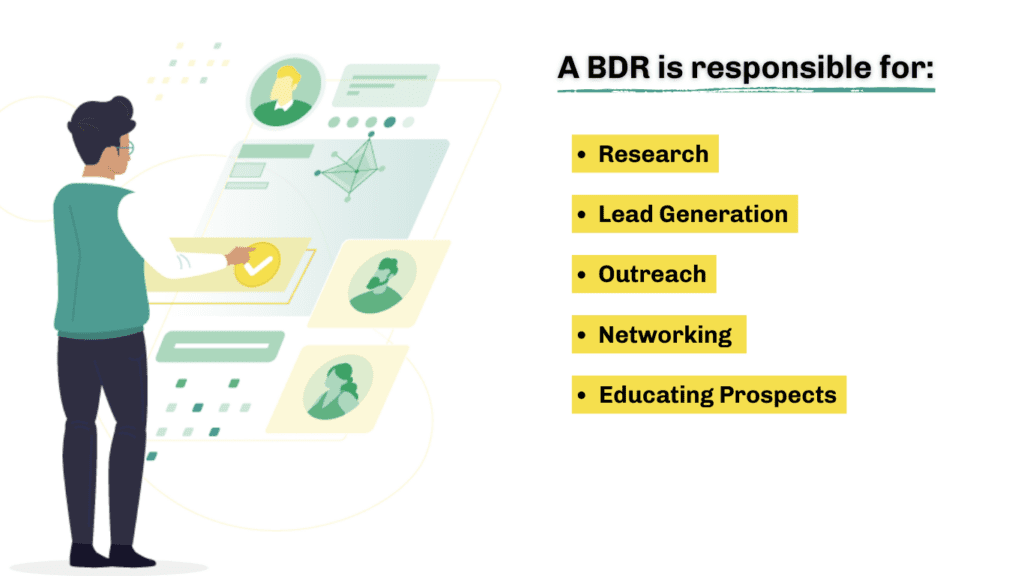Business development representatives (BDRs) play a vital role in B2B tech sales by prospecting for new leads, qualifying those leads, and passing them to sales teams.
Business development representatives stand at the forefront of the B2B sales process. Their main purpose is to generate qualified leads with methods like cold-calling, social media marketing, and email. They then pass these leads onto their sales teams, which are ultimately responsible for closing sales.
BDRs are in high demand, especially in Canada’s fast-growing B2B tech sector, where companies constantly require people to seek out and qualify new leads. Their roles have a direct impact on the company’s bottom line, and they work closely with sales and marketing teams to expand their reach, and maintain a strong brand.
What are the day-to-day tasks in BDR roles?
A BDR’s role is research-oriented. Their job is not just to generate as many leads as possible, but to exhaustively vet those leads for the optimal allocation of sales and marketing budgets. They cannot rely too heavily on automation tools and semi-personalized email templates, so instead, their task is to identify leads that align with the business’s customer profiles and behavioral data. For example, they might conduct research on professional networking platforms like LinkedIn in order to shortlist potential customers.
After compiling and analyzing lead data, the next day-to-day responsibility of a BDR is to qualify leads, and prioritize promising ones. There are many ways to qualify potential leads, such as identifying a need or a pain point that tech products or services might address. BDRs also qualify leads based on demographic attributes, and past behavior.
The next step is to contact the leads. A BDR is typically the first point of contact that a potential customer will have with a business. However, BDRs don’t do the selling—that is the job of the sales team itself. Rather, the goal of the BDR is to inform and educate customers , and let them know products and services can solve their problems. This may involve email, phone calls, or reaching out to potential connections on social media. Timing is important in the day-to-day tasks of a BDR, since they need to follow up with queries promptly, and be ready to practice pitches and manage objections.

What are the best skills to have as a BDR?
Like sales representatives, BDRs need a specialized skill set comprising a range of personal and interpersonal skills. In the case of tech sales companies, they also need to have general tech skills, as well as a working knowledge of the product and the challenges it addresses. A thorough knowledge of their brand’s position in the market is also vital, since this is what helps them identify and qualify the most suitable leads.
Interpersonal skills are vital for BDRs. First impressions count, so BDRs must exhibit empathy, confidence, and active listening. They must be strong team players, as they will be working closely with the sales and marketing team and business stakeholders.
Creativity and adaptability are also important soft skills for BDRs to have. They must be able to communicate their value propositions to prospects in a concise and personalized manner, and respond creatively to possible objections or concerns. Since they engage with people from all walks of life, they must be adaptable too. An ability to communicate effectively cannot be underestimated, since it is vital for building rapport and trust in an area that might otherwise become saturated with aggressive advertising.
The BDR role is multidisciplinary. Good business acumen is essential for success, as is insider knowledge on the industry and the challenges, opportunities, and trends it faces. Conducting marketing analyses and leveraging data-driven insights is also important, so BDRs must be accustomed with everyday business technologies, such as business intelligence, data analytics and customer relationship management (CRM). Most BDRs also rely on a degree of automation to increase efficiency and automate repetitive tasks so that they can focus their energies on making more personal connections with potential customers.
What is the work environment like?
BDRs play a vital role in the earlier stages of the customer journey. Particularly in an industry like B2B technology, the stakes are high, and potential customers may have lofty demands. Furthermore, BDRs must work closely with sales and marketing teams, as well as business stakeholders. This means the work environment is highly collaborative. It can be stressful at times, but the rewards are high, and BDRs report high job satisfaction. In addition, there are many opportunities for career growth.
Traditionally, BDRs worked exclusively in company offices, alongside the sales team. However, in today’s distributed work environment, they are just as likely to work from home or in a hybrid environment. While this gives knowledge workers like BDRs a greater degree of flexibility over how they manage their work/life balance, it also introduces new challenges when it comes to collaboration and communication. After all, it can be difficult to maintain a strong corporate culture in a distributed work environment. Because of this, BDRs should be comfortable working with remote collaboration and video conferencing platforms.
In some cases, BDRs might work across multiple teams and offices, especially in the case of large B2B tech firms that offer a wide range of products and services. As such, BDRs rarely work alone, and will often find themselves conducting or participating in meetings with different departments and business leadership itself.
Working for a high-growth B2B tech company can be highly rewarding. The work environment is dynamic, and BDRs have to adapt and change with the times. The role is suited to people who enjoy challenges, thrive with unpredictability, and who are able to think outside the box.
What are some tips and tricks for success as a BDR?
Successful BDRs make use of a wide range of tools and tactics to improve efficiency across their day-to-day workflows. When taking up a new position, the first thing to be done is to structure the day by dedicating time to specific tasks, ideally punctuated with short breaks.
BDRs should have a standardized and efficient process for ranking leads. They will usually use the company CRM platform to do this. For example, BDRs might rate their leads by high, medium, and low. High-level leads might include business decision makers, to whom they will focus most of their efforts by sending targeted emails and personalized connection requests on social media. The medium-level leads might include influencers worth connecting with, in order to move up to decision-makers. Low-level leads are less-than-ideal fits, but may still be worth connecting with on social media, or with generic email campaigns. In these cases, a BDR might rely a lot on automation software to connect and follow up with low-level leads.
Keeping organized is a must for any BDR. In addition to creating and regularly updating day-to-day task calendars, they should organize and regularly review their sales collateral. It is essential that they have easy access to relevant material, such as whitepapers or ebooks to share with leads when the need arises. 
An effective BDR always takes a goal-driven approach, with daily and weekly goals based on data-driven insights and current business priorities. For example, they might have a personal daily goal of identifying and qualifying a minimum number of leads. They should also have an established and adaptable, process for following up with leads, creating opportunities, and passing those on to sales and marketing representatives.
Finally, a successful BDR works smart. They realize that their role is not all about the volume of calls they make, or the number of emails they send. Instead, they take a strategic approach designed to establish commonality with potential leads by determining what they are passionate about, and where their pain points lie. To that end, it is not a game of numbers alone, but about building up a portfolio of relevant, high-quality leads who are likely to become valuable B2B tech customers.
Why is this a great career?
Being a business development representative in a high-growth B2B tech company can be very rewarding. According to Talent.com, a BDR can expect to earn an average salary of around $57,000 per year in Canada, with entry-level positions starting at $46,000. There may be other perks too, such as generous bonuses for recruiting a high volume of quality leads. Some BDRs get paid commissions and tips, and there may also be profit-sharing opportunities.
Those with a background in sales and marketing are ideally suited for a BDR role. There are numerous tech sales careers in Canada, many well suited to newcomers to the country, for mothers returning to work, and for gig workers looking for a more stable job. The industry is stable at a time when others are reeling from the pandemic.
SalesCamp by Palette Skills is a tech sales bootcamp that gives participants real connections with industry professionals and provides hands-on training and skills development. Apply now to get what it takes to succeed in the industry.








